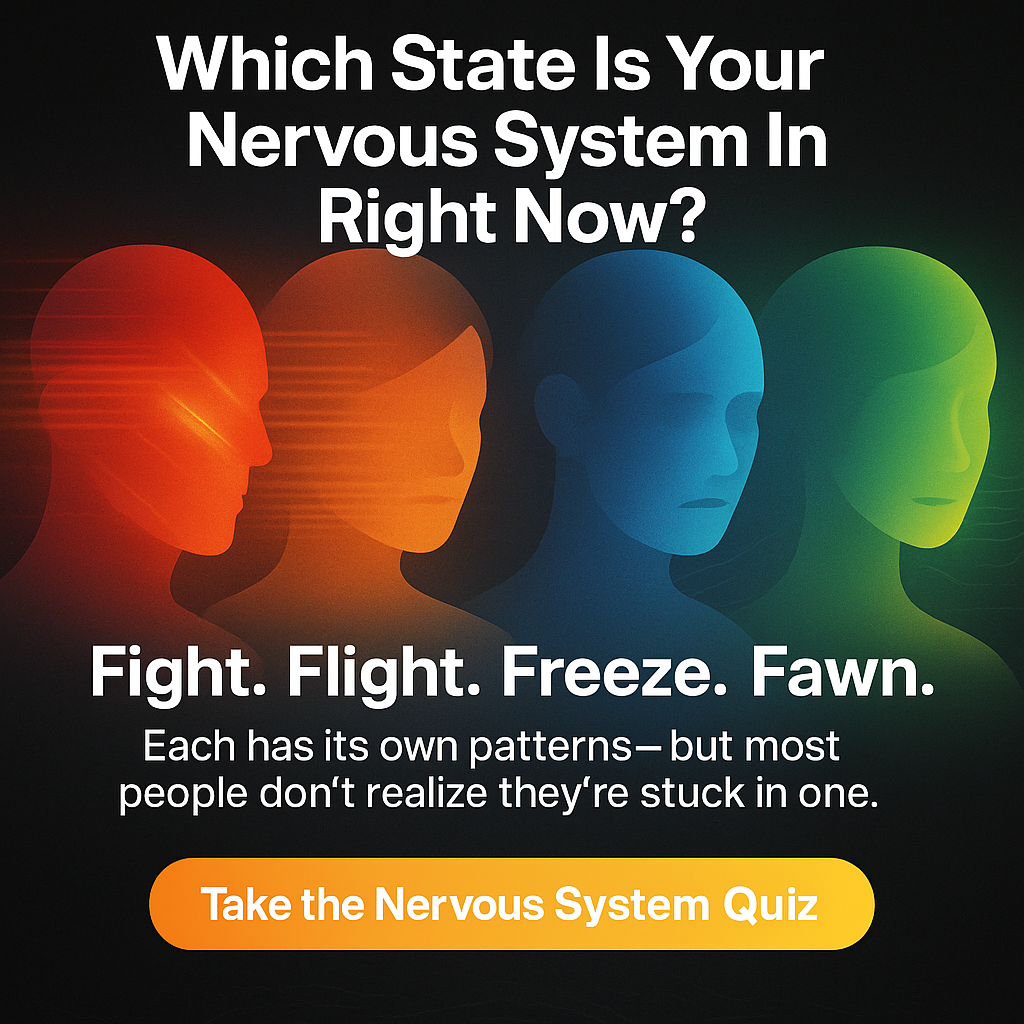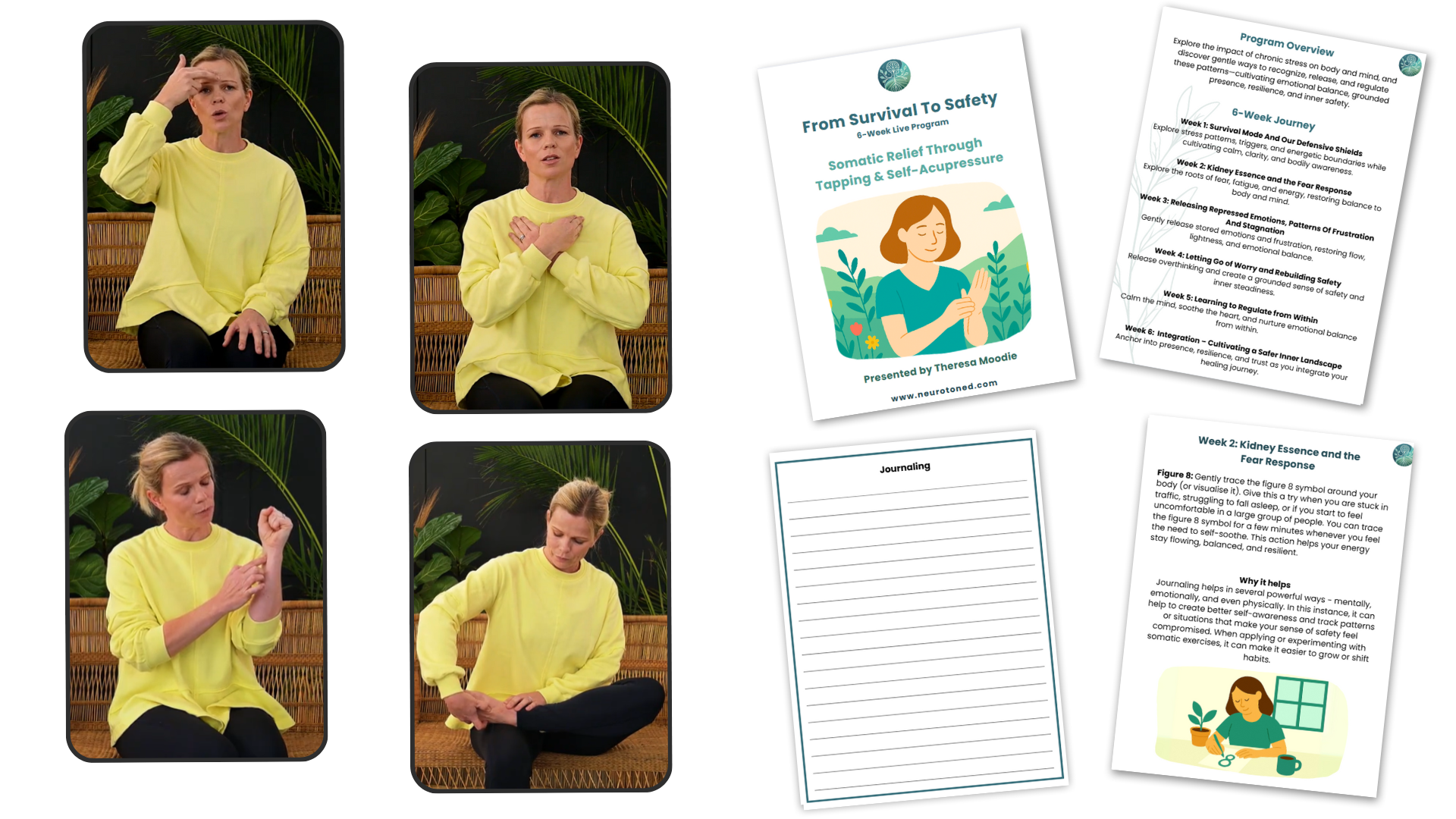
Quick Nervous System Resets Every New Parent Can Use
If you’re a new parent, your body is probably running in a state of near-constant alert. Interrupted sleep, sudden cries, decision overload, and the sheer responsibility of caring for a tiny human all pull your nervous system upward.
If you want to understand the exact stress loop your body gets stuck in, the Stress Loop Quiz may help you notice the patterns.
You don’t need long routines to feel a shift. You just need a few small tools that meet you right where you are.
Featured Answer
New parents can calm their nervous system with fast, sensory-based tools you can use while holding a baby, standing in the kitchen, or collapsing into bed. Helpful options include slow exhales, grounding touch, orienting your eyes, simple humming, and using warmth or weight to bring your body back into the present moment. Many people find these micro-resets help interrupt overwhelm and support a steadier baseline.
Why New Parents Feel So Overwhelmed
Your system has been scanning for danger for months now.
Feedings. Crying. Night wakings. Health worries.
Your body tries to protect you by keeping you “ready.” But that readiness can tip into anxiety, irritability, numbness, or shutdown.
If your body often feels wired for no obvious reason, you may appreciate the explanation shared in Why Do I Always Feel Ready To Jump Out Of My Skin For No Reason?
This stage of life doesn’t mean something is wrong with you. It means your nervous system is working overtime, and you deserve gentler support.
Fast Nervous System Resets For New Parents
1. The Soft Exhale Reset
When your exhale becomes longer than your inhale, your body receives a cue that the threat is easing.
Try this:
Inhale gently for 2–3 seconds.
Exhale for 4–6 seconds.
Repeat 3 times.
If deep breathing makes you anxious, explore the alternatives in Why Deep Breathing Makes Me More Anxious, And What To Do Instead.
2. Warm Hand Reset
Your body softens when it feels warmth and steady pressure.
One warm hand on your chest.
One on your belly or cheek.
Hold for 10–20 seconds.
This mirrors simple vagus-based practices described in Vagus Nerve Stimulation Exercises Without Devices.
3. The Orienting Reset
Look around your space slowly. Let your eyes land on something comforting or neutral.
This practice comes from Polyvagal principles, and you can explore it more deeply in Orienting Practice: A Gentle Way to Calm Your Nervous System.
4. The Humming Reset
Humming helps regulate your vagus nerve and brings a surprising sense of “settling.”
Hum on your exhale.
Keep it soft so you don’t wake the baby.
You can use this gentle guide in How Humming and Gargling can Calm Your Nervous System.
This pairs beautifully with the step-by-step guidance in Vagus Nerve Breathing For Trauma Recovery.
5. Weighted or Warm Object Reset
Hold something with gentle weight:
A mug, a folded blanket, a warm compress, or even your baby’s swaddle with pressure.
Weight brings your nervous system “back into your edges.”
If you feel numb or foggy when stressed, the explanation in Why Your Body Goes Numb During Stress may be grounding for you.
A 7-Day Micro Reset Plan for New Parents
Day 1: Soft-exhale reset during the first feeding of the day.
Day 2: Warm-hand reset before responding to a cry.
Day 3: Orienting reset during a moment of overwhelm.
Day 4: Hum one long exhale while rocking the baby.
Day 5: Weighted-object reset before bed.
Day 6: Name one feeling: “I feel ___ and it makes sense.”
Day 7: Take the Stress Loop Quiz to understand your stress pattern.
Common Sticking Points
“I don’t have time.”
These resets take 10–30 seconds. Most can be done while holding your baby.
“I feel nothing.”
Start with weight or warmth. These reach your system more quickly.
“Breathing makes me anxious.”
Skip breathwork and use orienting, humming, or grounding touch.
“I feel guilty calming myself when the baby needs so much.”
Your nervous system sets the tone for the home. Regulation is a form of caregiving.
If you resonate with the caregiver side of this struggle, you may like Trauma-Informed Nervous System Tips for Caregivers.
FAQs
Can these help if I have postpartum anxiety?
They are not treatment, but many parents find they create a moment of space. Consider talking with a professional if symptoms persist.
What if I get more anxious when I try to slow down?
Use orienting or warmth instead of breathwork. Keep practices very small.
How many times a day should I do this?
Tiny resets sprinkled through your day usually work best.
Do these help during nighttime wakings?
Yes. Warm-hand and soft-exhale resets work well in low light.
More Gentle Reads
- A Gentle Nighttime Nervous System Routine for Busy Moms
- A 10-Minute Nervous System Reset For Overwhelm You Can Do Anywhere
- Nervous System Regulation for Burnout Recovery
Disclaimer: This article is educational and not medical advice. If you have health concerns, consider speaking with a qualified professional.
Discover Your Vagal Tone
Find out how dysregulated your nervous system is and get your personalized roadmap to feeling calm, energized, and in control


